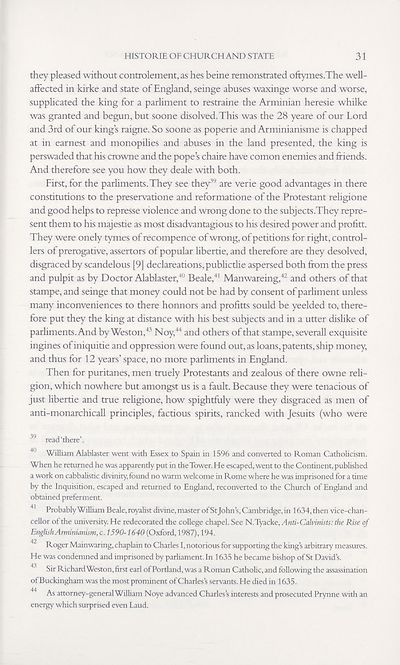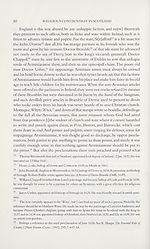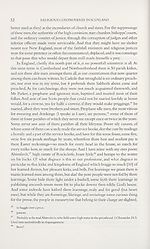Series 5 > Religious Controversy in Scotland 1625-1639
(46) Page 31
Download files
Complete book:
Individual page:
Thumbnail gallery: Grid view | List view

HISTORIE OF CHURCH AND STATE
31
they pleased without controlement, as hes beine remonstrated oftymes.The well-
afFected in kirke and state of England, seinge abuses waxinge worse and worse,
supplicated the king for a parliment to restraine the Arminian heresie whilke
was granted and begun, but soone disolved.This was the 28 yeare of our Lord
and 3rd of our king’s raigne. So soone as poperie and Arminianisme is chapped
at in earnest and monopilies and abuses in the land presented, the king is
perswaded that his crowne and the pope’s chaire have comon enemies and friends.
And therefore see you how they deale with both.
First, for the parliments.They see they39 are verie good advantages in there
constitutions to the preservatione and reformatione of the Protestant religione
and good helps to represse violence and wrong done to the subjects.They repre¬
sent them to his majestic as most disadvantagious to his desired power and profitt.
They were onely tymes of recompence of wrong, of petitions for right, control¬
lers of prerogative, assertors of popular libertie, and therefore are they desolved,
disgraced by scandelous [9] declamations, publictlie aspersed both from the press
and pulpit as by Doctor Alablaster,40 Beale,41 Manwareing,42 and others of that
stampe, and seinge that money could not be had by consent of parliment unless
many inconveniences to there honnors and profitts sould be yeelded to, there¬
fore put they the king at distance with his best subjects and in a utter dislike of
parliments.And by Weston,43 Noy,44 and others of that stampe, severall exquisite
ingines of iniquitie and oppression were found out, as loans, patents, ship money,
and thus for 12 years’ space, no more parliments in England.
Then for puritanes, men truely Protestants and zealous of there owne reli¬
gion, which nowhere but amongst us is a fault. Because they were tenacious of
just libertie and true religione, how spightfuly were they disgraced as men of
anti-monarchicall principles, factious spirits, rancked with Jesuits (who were
39 read‘there’.
40 William Alablaster went with Essex to Spain in 1596 and converted to Roman Catholicism.
When he returned he was apparendy put in the Tower. He escaped, went to the Continent, published
a work on cabbalistic divinity, found no warm welcome in Rome where he was imprisoned for a time
by the Inquisition, escaped and returned to England, reconverted to the Church of England and
obtained preferment.
41 Probably William Beale, royalist divine, master of St John’s, Cambridge, in 1634, then vice-chan¬
cellor of the university. He redecorated the college chapel. See N.Tyacke, Anti-Calvinists: the Rise of
English Arminianism,c. 1590-1640 (Oxford, 1987), 194.
42 Roger Mainwaring, chaplain to Charles I, notorious for supporting the king’s arbitrary measures.
He was condemned and imprisoned by parliament. In 1635 he became bishop of St David’s.
43 Sir Richard Weston, first earl of Portland, was a Roman Catholic, and following the assassination
of Buckingham was the most prominent of Charles’s servants. He died in 1635.
As attorney-general William Noye advanced Charles’s interests and prosecuted Prynne with an
energy which surprised even Laud.
31
they pleased without controlement, as hes beine remonstrated oftymes.The well-
afFected in kirke and state of England, seinge abuses waxinge worse and worse,
supplicated the king for a parliment to restraine the Arminian heresie whilke
was granted and begun, but soone disolved.This was the 28 yeare of our Lord
and 3rd of our king’s raigne. So soone as poperie and Arminianisme is chapped
at in earnest and monopilies and abuses in the land presented, the king is
perswaded that his crowne and the pope’s chaire have comon enemies and friends.
And therefore see you how they deale with both.
First, for the parliments.They see they39 are verie good advantages in there
constitutions to the preservatione and reformatione of the Protestant religione
and good helps to represse violence and wrong done to the subjects.They repre¬
sent them to his majestic as most disadvantagious to his desired power and profitt.
They were onely tymes of recompence of wrong, of petitions for right, control¬
lers of prerogative, assertors of popular libertie, and therefore are they desolved,
disgraced by scandelous [9] declamations, publictlie aspersed both from the press
and pulpit as by Doctor Alablaster,40 Beale,41 Manwareing,42 and others of that
stampe, and seinge that money could not be had by consent of parliment unless
many inconveniences to there honnors and profitts sould be yeelded to, there¬
fore put they the king at distance with his best subjects and in a utter dislike of
parliments.And by Weston,43 Noy,44 and others of that stampe, severall exquisite
ingines of iniquitie and oppression were found out, as loans, patents, ship money,
and thus for 12 years’ space, no more parliments in England.
Then for puritanes, men truely Protestants and zealous of there owne reli¬
gion, which nowhere but amongst us is a fault. Because they were tenacious of
just libertie and true religione, how spightfuly were they disgraced as men of
anti-monarchicall principles, factious spirits, rancked with Jesuits (who were
39 read‘there’.
40 William Alablaster went with Essex to Spain in 1596 and converted to Roman Catholicism.
When he returned he was apparendy put in the Tower. He escaped, went to the Continent, published
a work on cabbalistic divinity, found no warm welcome in Rome where he was imprisoned for a time
by the Inquisition, escaped and returned to England, reconverted to the Church of England and
obtained preferment.
41 Probably William Beale, royalist divine, master of St John’s, Cambridge, in 1634, then vice-chan¬
cellor of the university. He redecorated the college chapel. See N.Tyacke, Anti-Calvinists: the Rise of
English Arminianism,c. 1590-1640 (Oxford, 1987), 194.
42 Roger Mainwaring, chaplain to Charles I, notorious for supporting the king’s arbitrary measures.
He was condemned and imprisoned by parliament. In 1635 he became bishop of St David’s.
43 Sir Richard Weston, first earl of Portland, was a Roman Catholic, and following the assassination
of Buckingham was the most prominent of Charles’s servants. He died in 1635.
As attorney-general William Noye advanced Charles’s interests and prosecuted Prynne with an
energy which surprised even Laud.
Set display mode to:
![]() Universal Viewer |
Universal Viewer | ![]() Mirador |
Large image | Transcription
Mirador |
Large image | Transcription
Images and transcriptions on this page, including medium image downloads, may be used under the Creative Commons Attribution 4.0 International Licence unless otherwise stated. ![]()
| Scottish History Society volumes > Series 5 > Religious Controversy in Scotland 1625-1639 > (46) Page 31 |
|---|
| Permanent URL | https://digital.nls.uk/127328517 |
|---|
| Description | Over 180 volumes, published by the Scottish History Society, containing original sources on Scotland's history and people. With a wide range of subjects, the books collectively cover all periods from the 12th to 20th centuries, and reflect changing trends in Scottish history. Sources are accompanied by scholarly interpretation, references and bibliographies. Volumes are usually published annually, and more digitised volumes will be added as they become available. |
|---|


